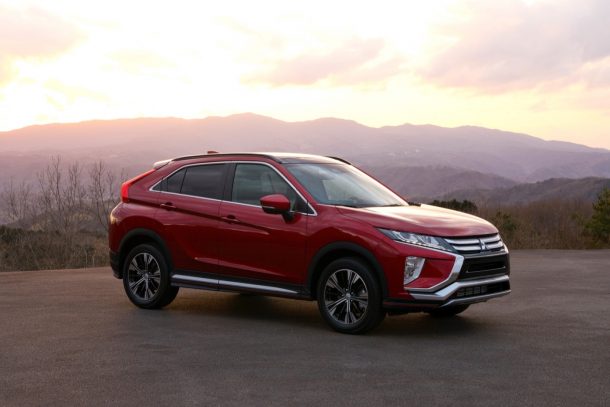Practicality Will Dictate Mitsubishi's Foreseeable Future

Mitsubishi has quite the storied history, but for car lovers things don’t really kick off until the 1970s, when the company spun off Mitsubishi Motors from its Heavy Industries division. With help from Chrysler, the Japanese company managed a foothold in North America and started escalating volume. Before long, Mitsubishi was delivering economically minded vehicles to the American masses while fleshing out its lineup to include sporting models.
By the 1990s, Mitsubishi was the underdog option for discerning import enthusiasts. But all of those spectacular models gradually started to vanish. The 3000GT disappeared from the market, the Eclipse morphed into an overweight cruiser without the option of all-wheel drive, the Galant lost its excellent VR-4 variant, and the company never bothered to replace any of its previously discontinued performance models to pick up the slack. Eventually, Mitsubishi even abandoned the beloved Lancer Evolution due to hard times.
While it wasn’t abnormal to see Japanese manufacturers cater to mainstream tastes in the 2000s, usually trimming down their performance offerings at the same time, most attempted to reestablish themselves by introducing new/returning performance models (Toyota/Honda) or simply holding onto older sporting models (Nissan) in recent years. Conversely, Mitsubishi has done neither.
However, as conditions continue to improve for the company, speculation has run rampant that it might make another run at an all-wheel drive rally machine bearing the Evo name. Unfortunately, all we’ve seen is the company reviving iconic sporting nameplates for use on less exciting utility vehicles — we’re looking at you, Mitsubishi Eclipse Cross.
That strategy doesn’t appear to be in any danger of changing, either. According to a recent interview between managing director of Mitsubishi UK Rob Lindley and CarThrottle, chasing after performance models is not prudent at this juncture.
“Mitsubishi’s focus is now SUVs, crossover, four-wheel drive, along with alternative fuel technology,” Lindley explained from the floor of the Geneva Motor Show. “Mitsubishi has moved around different brand positionings, whether it’s been Spacestar style vehicles or sports car derivatives, Evo — it’s not had that clarity of focus.”
“As a business that sells 1.2 million cars worldwide, in a global sense, it’s not a big business. If you try and be in all the different segments of the market and follow trends, like sports cars, it would be difficult to be economically viable,” he continued. “I don’t know how many people focus in on that [performance cars] now. I don’t think it’s a large segment of today’s car market.”
It’s understandable that the brand has to follow the money, but this author knows from firsthand experience that a comment like that is not likely to make long-time fans of the brand’s past work any happier. Lindley doesn’t seem worried.
“I don’t think it’s a curse,” he said. “Having any kind of fanbase that has a huge following for a brand is always a massive asset because those type of customers drive other vehicles as well. They may love the historical Evos and sports cars, but there’s a good chance they have other kinds of vehicles in the garage.”
With the Evo out of production since 2016, we’d say there’s an incredibly good chance people have all sorts of other cars in their garage — likely from rival manufacturers. But Linley does have a point. It doesn’t make sound financial sense for Mitsubishi to chase down a small faction of enthusiasts when it can tap into popular trends within the broader market. Still, we believe the car gods would smile on the brand if it did (perhaps with help from Nissan and Renault).
Good faith efforts can go a long way in improving a brand’s image and, while we see Mitsubishi trying hard to right the ship, it’s doing so in the most vanilla way imaginable.
[Images: Mitsubishi Motors]

A staunch consumer advocate tracking industry trends and regulation. Before joining TTAC, Matt spent a decade working for marketing and research firms based in NYC. Clients included several of the world’s largest automakers, global tire brands, and aftermarket part suppliers. Dissatisfied with the corporate world and resentful of having to wear suits everyday, he pivoted to writing about cars. Since then, that man has become an ardent supporter of the right-to-repair movement, been interviewed on the auto industry by national radio broadcasts, driven more rental cars than anyone ever should, participated in amateur rallying events, and received the requisite minimum training as sanctioned by the SCCA. Handy with a wrench, Matt grew up surrounded by Detroit auto workers and managed to get a pizza delivery job before he was legally eligible. He later found himself driving box trucks through Manhattan, guaranteeing future sympathy for actual truckers. He continues to conduct research pertaining to the automotive sector as an independent contractor and has since moved back to his native Michigan, closer to where the cars are born. A contrarian, Matt claims to prefer understeer — stating that front and all-wheel drive vehicles cater best to his driving style.
More by Matt Posky
Latest Car Reviews
Read moreLatest Product Reviews
Read moreRecent Comments
- W Conrad I'd gladly get an EV, but I can't even afford anything close to a new car right now. No doubt if EV's get more affordable more people will be buying them. It is a shame so many are stuck in their old ways with ICE vehicles. I realize EV's still have some use cases that don't work, but for many people they would work just fine with a slightly altered mindset.
- Master Baiter There are plenty of affordable EVs--in China where they make all the batteries. Tesla is the only auto maker with a reasonably coherent strategy involving manufacturing their own cells in the United States. Tesla's problem now is I think they've run out of customers willing to put up with their goofy ergonomics to have a nice drive train.
- Cprescott Doesn't any better in red than it did in white. Looks like an even uglier Honduh Civic 2 door with a hideous front end (and that is saying something about a Honduh).
- Kwik_Shift_Pro4X Nice look, but too short.
- EBFlex Considering Ford assured us the fake lightning was profitable at under $40k, I’d imagine these new EVs will start at $20k.





































Comments
Join the conversation
The base drivetrain in the Outlander Sport is a tried-and-true 20th-century-tech 2.0 4-cyl making 148 hp with a 5-sp manual. How hard would it be for Mitsubishi to put that drivetrain in the Mirage, firm up the suspension a little, raise the price by $3000, and call it the Mirage Ralliart? That'd be a fun little car and still practical and reliable too.
They're probably doing it right. There are already too many performance cars out there which aren't selling, which, while not particularly good news for the future of the genre, is going to be great for those who like those kind of cars starting in a few years. I predict we're going to get to enjoy our own version of the 1973-81 era, where you can't give away a muscle car and people get into fist fights over CUVs (like they fought over diesel Rabbits back in those days). Of course, nobody can see the future, least of all me. But I am confident enough in that to have planned my car buying strategy over the next 6 years around it. There will be some great fast vehicles for not a lot of money starting in 2021 or so if you're willing to live outside the mainstream.